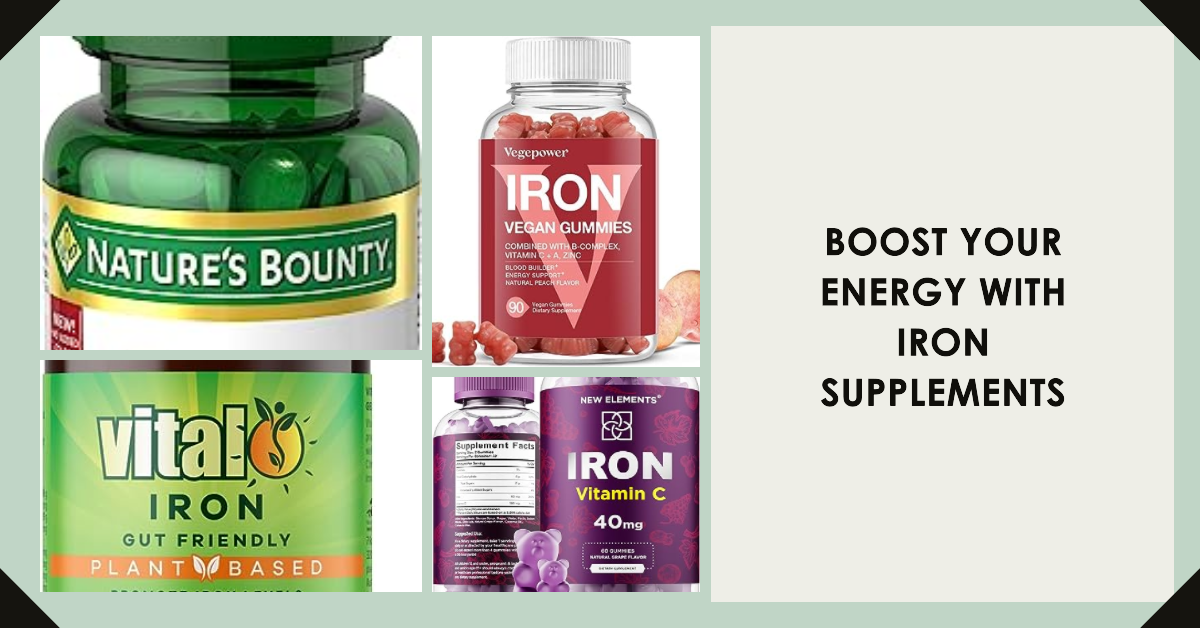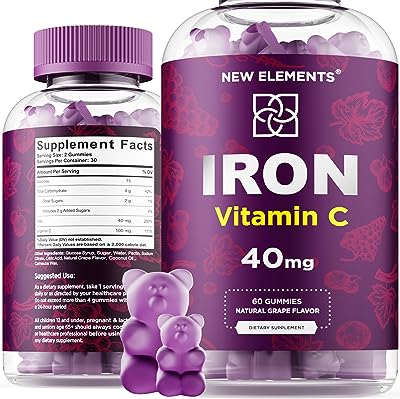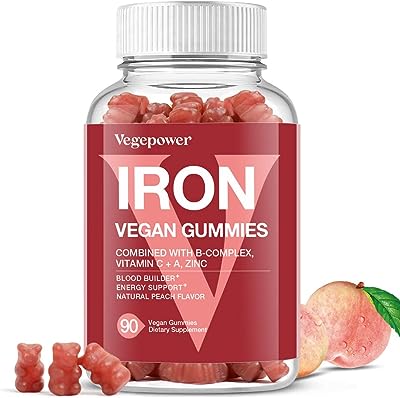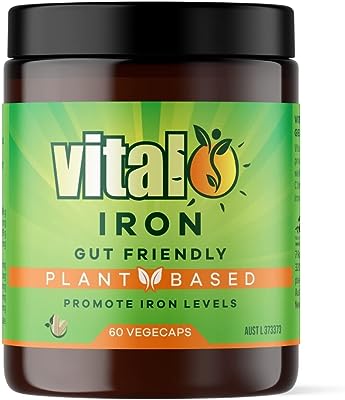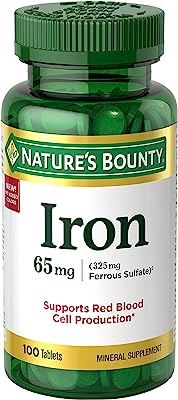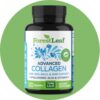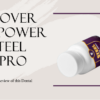Introduction
Key Takeaways
- Iron is vital for the body, playing a key role in oxygen transport, energy production, and supporting metabolic functions.
- Iron deficiency can lead to anemia, resulting in symptoms like fatigue, weakness, and shortness of breath.
- Iron supplements, particularly ferrous sulfate, can effectively address iron deficiency and improve energy levels and physical performance.
- When taking iron supplements, potential digestive issues, medication interactions, and risks of iron overload should be considered.
- Enhancing iron intake can also be achieved naturally through consuming iron-rich foods, combining them with vitamin C, and cooking in cast iron pans.
So you’ve been experiencing fatigue and low energy levels lately? Well, it might be time to consider adding iron supplements to your daily routine. Iron supplements have long been known to boost energy and fight anemia, particularly in women.
Anemia, a condition characterized by a deficiency of red blood cells or hemoglobin in the blood, can leave you feeling weak, tired, and lacking in vitality.
But fear not, because iron supplements can help replenish those iron stores and revitalize your body, giving you the energy you need to tackle each day head-on.
Whether you’re a busy working mom, an active athlete, or just someone looking to feel more energized, incorporating iron supplements into your daily regimen may be the solution you’ve been searching for.
The Importance of Iron for the Body
Iron is an essential mineral that plays a vital role in the human body. It is responsible for carrying oxygen to all parts of the body and supporting various metabolic functions. Without adequate iron levels, our bodies cannot function optimally.

Photo: Amazon
In this article, we will explore the function of iron in the body, the recommended daily intake of iron, the common causes of iron deficiency, the role of iron in boosting energy, understanding anemia, the link between iron and anemia, the benefits of iron supplements, choosing the right iron supplement, risks and side effects of iron supplements, tips for taking iron supplements, and other ways to increase iron levels.
Function of iron in the body
Iron plays a crucial role in the formation of hemoglobin, a protein in red blood cells that carries oxygen from the lungs to every cell in the body. It is also involved in the production of myoglobin, a protein in muscles that helps store oxygen for energy production during physical activity.
Iron is a vital component of various enzymes that are involved in energy production, DNA synthesis, and immune function. Additionally, iron is necessary for proper brain function, as it contributes to the production of neurotransmitters.
Recommended daily intake of iron
The daily intake of iron varies depending on factors such as age, sex, and life stage. The average recommended daily intake of iron for adult men is 8 milligrams (mg), while adult women require 18 mg during childbearing years.
Pregnant women have higher iron requirements, needing 27 mg daily. After menopause, women’s iron needs decrease to 8 mg per day. It is important to note that these numbers may vary depending on individual circumstances and health conditions, so it is always best to consult with a healthcare professional for personalized recommendations.
Common Causes of Iron Deficiency
Iron deficiency occurs when there is an insufficient amount of iron in the body to meet its needs. Several factors can contribute to iron deficiency, including inadequate dietary intake, increased iron requirements, poor iron absorption, and chronic blood loss.
Inadequate dietary intake
One of the primary causes of iron deficiency is a lack of iron-rich foods in the diet. Vegetarians and vegans, in particular, may be at a higher risk of iron deficiency as they do not consume animal-based sources of iron, which are more easily absorbed by the body. Additionally, individuals with restrictive diets or poor appetite may not consume enough iron-rich foods to meet their daily requirements.
Increased iron requirements
Certain life stages and conditions can increase the body’s demand for iron. Pregnancy, for example, necessitates higher iron intake to support the growth and development of the fetus and the increased blood volume. Similarly, infants, children, and adolescents have higher iron requirements due to rapid growth and development.
Poor iron absorption
Even if you consume an adequate amount of iron, poor absorption can still lead to iron deficiency. Some individuals may have conditions that affect their body’s ability to absorb iron properly, such as celiac disease, inflammatory bowel disease, or gastrointestinal surgeries that affect the absorption site.
Chronic blood loss
Chronic blood loss is another common cause of iron deficiency. Conditions such as heavy menstruation, gastrointestinal bleeding, or regular blood donations can result in ongoing blood loss, leading to a decrease in iron levels over time.
The Role of Iron in Boosting Energy
Iron plays a significant role in boosting energy levels as it is involved in energy production within the cells. When we consume iron-rich foods or supplements, it enters our bloodstream and binds with transferrin, a protein that transports iron throughout the body.
From there, it reaches the bone marrow, where it is used for the production of red blood cells. Red blood cells, with the help of iron-containing hemoglobin, carry oxygen from the lungs to every cell in the body. This oxygen is essential for energy production through a process called cellular respiration, which occurs in the mitochondria of our cells.
Iron-deficiency anemia and fatigue
When there is an insufficient amount of iron in the body, the production of red blood cells and hemoglobin decreases. This leads to a condition called iron-deficiency anemia, characterized by low levels of hemoglobin and red blood cells. Iron-deficiency anemia can result in fatigue and a general lack of energy as the body struggles to transport an adequate amount of oxygen to the tissues and organs.
Understanding Anemia
What is anemia?
Anemia is a condition characterized by a decrease in the number of red blood cells or a decrease in the amount of hemoglobin in the blood. Hemoglobin is the protein responsible for carrying oxygen to the body’s tissues. As a result, individuals with anemia may experience symptoms such as fatigue, weakness, shortness of breath, pale skin, and a rapid or irregular heartbeat.
Types of anemia
There are several different types of anemia, each with its own specific cause. Iron-deficiency anemia, as mentioned earlier, is the most common type and occurs when there is a lack of iron in the body. Other types of anemia include vitamin B12 deficiency anemia, folate deficiency anemia, and anemia of chronic disease.
Symptoms and causes of anemia
The symptoms of anemia may vary depending on the type and severity of the condition. In addition to the general symptoms mentioned earlier, individuals with anemia may experience dizziness, headaches, cold hands and feet, chest pain, and difficulty concentrating.
The causes of anemia can range from nutritional deficiencies, chronic diseases, inherited conditions, and certain medications. It is important to consult with a healthcare professional to determine the underlying cause of anemia and develop an appropriate treatment plan.
Any Questions🤔?
Reach out to us! We’re here to clarify and prioritize your well-being. 🌟
The Link between Iron and Anemia
How iron deficiency leads to anemia
Iron deficiency is a common cause of anemia. When the body does not have enough iron to produce sufficient hemoglobin, the red blood cells become smaller and paler.
This impairs their ability to carry oxygen effectively, resulting in a reduced oxygen supply to the body’s tissues and organs. As a result, individuals with iron deficiency may experience the symptoms associated with anemia, such as fatigue, weakness, and shortness of breath.
Iron as a treatment for anemia
Treating anemia often involves addressing the underlying iron deficiency. Increasing iron intake through diet or supplementation can help replenish iron stores in the body and support the production of healthy red blood cells.
In cases of severe iron deficiency or anemia, healthcare professionals may recommend iron supplementation to expedite the recovery process. However, it is crucial to consult with a healthcare professional before starting any supplementation regimen to ensure proper dosage and optimal outcomes.
Benefits of Iron Supplements
Effectiveness of iron supplements
Iron supplements have been proven to be an effective treatment for iron deficiency anemia. They provide an easily absorbable form of iron that can quickly replenish iron stores in the body. Taking iron supplements as recommended by a healthcare professional can help restore normal iron levels and alleviate the symptoms associated with anemia.
Improved energy levels
One of the significant benefits of iron supplements is the potential improvement in energy levels. As iron levels increase, the body can produce an adequate number of red blood cells and hemoglobin, allowing for better oxygen transport to the body’s tissues. This improved oxygenation can lead to increased energy levels and reduced fatigue.
Enhanced physical performance
Iron plays a crucial role in oxygen utilization during exercise. Adequate iron levels support optimal oxygen delivery to the muscles, enhancing their function and performance. Individuals with iron deficiency may experience reduced endurance, decreased exercise tolerance, and slower recovery times.
By addressing iron deficiency through supplementation, athletes and active individuals can potentially improve their physical performance and maximize their training outcomes.

Photo: Amazon
Reduced symptoms of anemia
Iron supplements can help alleviate the symptoms associated with iron deficiency anemia. As iron levels are restored, individuals may experience a decrease in fatigue, weakness, and shortness of breath. Additionally, addressing iron deficiency can improve overall well-being, cognitive function, and immune response.
Choosing the Right Iron Supplement
Different forms of iron supplements
Iron supplements are available in various forms, such as ferrous sulfate, ferrous gluconate, and ferric iron. Ferrous sulfate is the most commonly recommended form as it contains a higher concentration of elemental iron per unit weight. However, different individuals may respond differently to each form, and it is essential to consult with a healthcare professional for personalized recommendations.
Considerations for choosing an iron supplement
When choosing an iron supplement, several factors should be considered. The recommended dosage, absorption rate, potential side effects, and interactions with other medications or supplements should all be taken into account.
It is always best to consult with a healthcare professional to determine the most suitable iron supplement based on individual needs and health conditions.
Risks and Side Effects of Iron Supplements
Digestive issues
One of the potential side effects of iron supplements is digestive issues. Some individuals may experience nausea, constipation, diarrhea, stomach cramps, or black stools. These side effects can be minimized by taking the supplement with food or dividing the dose throughout the day. If digestive issues persist or worsen, it is important to consult with a healthcare professional.
Interactions with medications
Iron supplements have the potential to interact with certain medications, reducing their effectiveness or causing adverse effects. It is crucial to inform your healthcare professional about all medications, including over-the-counter drugs and supplements, before starting an iron supplement.
They can provide guidance on the appropriate timing and potential interactions to ensure optimal outcomes and minimize risks.
Iron overload
Taking excessive amounts of iron supplements can lead to iron overload, a condition characterized by high levels of iron in the body. Iron overload can be toxic and may result in organ damage. It is crucial to follow the recommended dosage provided by a healthcare professional and to avoid self-diagnosing or self-medicating with iron supplements.

Photo: Amazon
Tips for Taking Iron Supplements
Best time to take iron supplements
Iron supplements are typically best absorbed when taken on an empty stomach, preferably one hour before meals or two hours after meals. However, some individuals may experience digestive discomfort when taking iron supplements on an empty stomach.
In such cases, taking the supplement with food can help minimize gastrointestinal side effects. It is important to follow the specific instructions provided with the iron supplement and consult with a healthcare professional if there are any concerns.
Dosage and duration
The dosage and duration of iron supplementation will depend on individual needs and the severity of iron deficiency. It is crucial to follow the recommended dosage provided by a healthcare professional and complete the full course of treatment to ensure optimal results. Taking too little iron may not address the deficiency adequately, while taking too much can lead to iron overload.
Enhancing iron absorption
To enhance iron absorption, it is recommended to consume iron-rich foods alongside sources of vitamin C. Vitamin C helps facilitate the absorption of iron in the body. Additionally, avoiding substances that inhibit iron absorption, such as caffeine and calcium, when taking iron supplements can help optimize iron absorption.
Other Ways to Increase Iron Levels
Iron-rich foods
In addition to iron supplementation, incorporating iron-rich foods into your diet is crucial for maintaining adequate iron levels. Some excellent sources of dietary iron include red meat, poultry, fish, legumes, leafy green vegetables, nuts, and seeds. Consuming a varied diet that includes these foods can help ensure a sufficient intake of iron and other essential nutrients.
Combining iron with vitamin C
As mentioned earlier, consuming vitamin C alongside iron-rich foods or iron supplements can enhance iron absorption. Foods high in vitamin C include citrus fruits, strawberries, kiwi, bell peppers, and tomatoes. Adding these vitamin C-rich foods to your meals or pairing them with iron sources can maximize the absorption of iron.
Cooking in cast iron pans
Cooking in cast iron pans can also be an effective way to increase iron intake. The iron from the pan can leach into the food during the cooking process, increasing its iron content. This method is especially beneficial when cooking acidic foods, as the high acidity helps facilitate iron absorption.

Photo: Amazon
In conclusion, maintaining adequate iron levels is crucial for overall health and well-being. Iron is essential for various bodily functions, including oxygen transport, energy production, and immune function. Iron deficiency can lead to anemia, characterized by fatigue, weakness, and other symptoms. Iron supplements can help alleviate iron deficiency and improve energy levels, physical performance, and symptoms associated with anemia.
However, it is important to choose the right iron supplement, follow recommended guidelines, and consult with a healthcare professional for personalized advice.
FAQ (Frequently Asked Question)
Q1: What are iron supplements primarily used for?
A1: Iron supplements are primarily used to treat iron-deficiency anemia and restore vital energy levels in individuals with low iron concentrations in their blood.
Q2: Are there any side effects to taking iron supplements?
A2: Yes, some common side effects include constipation, upset stomach, and black stools. It’s essential to follow the recommended dosage and consult a healthcare professional.
Q3: How quickly can I expect to see improvements after starting iron supplements?
A3: Improvement varies among individuals. Some may notice an increase in energy within a week, while for others, it may take up to a month or more to see significant changes in their hemoglobin levels.
Q4: Can I take iron supplements on an empty stomach?
A4: While it’s possible to take iron supplements on an empty stomach, it might increase the chances of experiencing side effects. It’s often recommended to take them with a small amount of food.
Q5: Are there specific foods or drinks I should avoid when taking iron supplements?
A5: Yes, it’s advisable to avoid calcium-rich foods, coffee, tea, and some antacids around the time of taking an iron supplement, as these can inhibit iron absorption.
Conclusion
In addition to supplementation, consuming iron-rich foods, combining iron with vitamin C, and cooking in cast iron pans can also help increase iron levels naturally. By understanding the importance of iron and taking proactive steps to maintain healthy iron status, you can support your body’s overall function and well-being.
Disclaimer
Please keep in mind that nothing said here should be construed as a substitute for professional medical or financial advice from a qualified financial advisor or a licensed healthcare provider. If you use pharmaceuticals or have concerns after reading the above review information, be sure to speak with a qualified physician or financial expert before making any purchasing decisions. Since the claims made about these products have not been reviewed by the Food and Drug Administration or Health Canada, individual outcomes may differ and cannot be guaranteed. Research that has been approved by the FDA or Health Canada has not attested to the efficacy of these products. These goods do not offer any form of get-rich-quick scheme and are not designed to diagnose, treat, cure, or prevent any ailment. The reviewer disclaims all liability for incorrect pricing. For exact prices, view the product sales page

